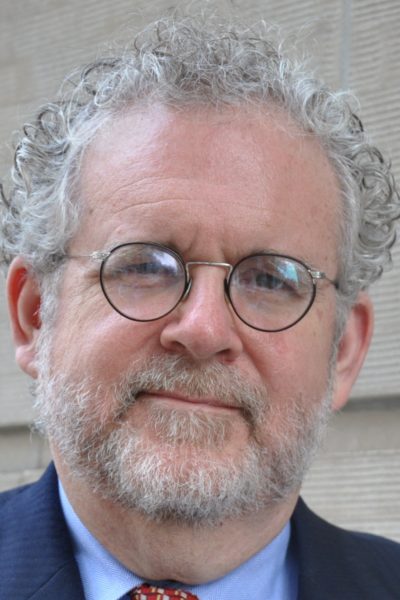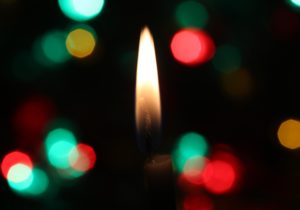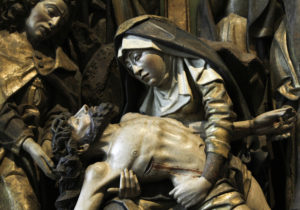Happy fifth day of Christmas, and welcome back to the 2019–20 Yule Blog, where we aim to keep the holiday fires burning right up through Twelfth Night on January 6.
Yesterday, King Herod’s massacre of every child in Bethlehem under the age of two shocked us out of the idea that Christmas is basically a sentimental holiday about sugarplums and reindeer. Christmas is serious business, at least as Christians understand it. But the most shocking thing about Christmas is what Christians think the holiday means.
The appalling claim of Christmas, that the baby in the manger is the God of Abraham and Isaac, the Maker of heaven and earth, the uncreated Creator of all things, is for many people as hard to understand as it is to believe. But that outrageous claim is why Christians celebrate the day: they believe that this baby, born of a virgin in Bethlehem of Judea, was the only begotten son of God, the long-prophesied Messiah, and the Savior of the world. For the people who think this, it makes perfect sense that the world’s biggest annual celebration is held in His honor; nobody ever born was more important or did more good.
Forget believing or disbelieving this; if we are going to understand what Christians mean by these ideas, we have to unpack some concepts and examine some unspoken assumptions. We need to know what Christians mean by God, why they think God had a Son, and what they think God’s Son was doing being born at all, much less being born in Bethlehem. These are some big questions, and we won’t get them all answered in one day; those of you who stick with me through the rest of the Christmas season will, I hope, have a better idea of how this all hangs together by the time we are done.
The place to start is with the idea of God: Why do Christians and so many other people believe in an invisible Ruler and Creator of the universe—and then how does the Christian idea of God differ from the others?
Whether we look at Christianity or at other religions, the idea of God doesn’t come from the realms of science or philosophy. That is, most people don’t believe in God because they work through a long philosophical argument. Most people haven’t taken classes in formal logic to evaluate the claims and counter-claims of various world philosophies. They have not been slowly driven to the logical necessity of a Prime Mover in the universe, or followed St. Anselm’s argument that existence is a necessary attribute of the greatest Being that our minds can conceive.
But neither do they believe in God because they are scientifically ignorant. They don’t believe in God because they think that God makes the thunder clap and the rain fall. They don’t believe in God because they’ve never heard of the theory of evolution and need an explanation for why the physical universe works the way it does.
Most people believe in God because they feel that life means something.
We are born, we move through life; if we are lucky, we grow old and die. As all this happens, we feel things. We feel connections to other people and creatures—to family, friends, lovers and spouses, work and professional colleagues, fellow citizens of a nation, fellow members of our species facing a common fate on a fragile planet, the animals that share our lives and our world. We see astounding acts of heroism and devotion, especially in everyday life. We see parents sacrificing for the sake of their children, young people caring for aged relatives, firemen rushing into burning buildings to save people they don’t even know, inspiring teachers who earn very little money but seem contented and fulfilled, volunteers giving spare time and money to their communities in many ways, judges who give honest verdicts without favor or fear—and on and on and on.
We also see beauty all around us: sunrise, sunset, the play of light on water, starry nights, the subtle colors of a grassy field, the awesome presence of a mountain range, dazzling tropical fishes, roses in a garden. We often feel there is some kind of connection between the beauty of nature and the beauty of human life well lived; many of us seek to respond to the beauty we see around us by creating beauty (whether in art, gardens, or our daily lives) of our own. The beauty inherent in the universe demands a response; we must try to live up to it somehow.
Moral beauty, physical beauty, feelings of love and devotion to people and causes that take us beyond ourselves: for most of us, the part of our life that feels truest, most real, and most fully lived revolves around these things.
Our lives in the world point us toward something beyond the facts of our lives. Eating, drinking, making babies: this is all very well, but our lives do more than revolve around the simple biological necessities. They point us toward meaning.
Most people, including a very large majority of those people who say they are atheists, believe that life means something. To this majority, the moral feelings we have about justice and duty (for example) aren’t just random biological signals that flash across our neurons in response to evolutionary patterns. We sometimes can’t articulate why this is true, but we feel that it matters that we do the right thing: that we bring up our kids well, that we honor our parents and care for them when they are old, that we remain loyal to our spouses and keep our wedding vows, that we behave fairly in our dealings with other people, and that we contribute to the greater good through the way we live our lives. There are people and causes for which many of us are willing (though perhaps not particularly eager) to die.
Maybe we feel this way because we are biologically hardwired to do so, but the reality is that the overwhelming majority of people around the world believe that life counts and that the whole is somehow greater than the sum of the parts.
This feeling that there is some meaning to our lives is the basis, I think, not only for the Christian religion and for all religions and mystical experiences; it is the basis for the many noble forms of ethical thought and philosophical reflection found among atheists and agnostics. Anyone who feels the pull of a higher path and greater responsibilities rather than just blindly grabbing what can be seized is moved by a vision of what matters and a sense of life’s meaning.
That sense of life’s meaning is our sense of the transcendent: an intuition that our experience points beyond itself to something important.
It seems to me that atheists and theists often exaggerate their differences. Both atheists and theists experience transcendence or meaning in their lives and both have faith that transcendence matters. Both try to live their lives in the light of their experiences of life’s meaning.
The difference between theists on the one hand and atheists and agnostics on the other is relatively minor compared with the difference between those who believe that life means something and those who don’t know and don’t care. Ethical atheists believe in the importance of justice, the need for self-control, and the need to live by an ethical code in the world just as much as religious people do. Like religious people, they often fail to live up to the codes they believe in, but that (for now) is not the point. The vast, overwhelming majority of the human race thinks that life means something and that we ought to honor that meaning in the way that we live.
Discussions and disputes about the nature of God are best understood as discussions about the nature of meaning. They involve the different answers people give to the question, What is life really all about?
Christians answer that question with a distinctive understanding of God; looking into that a little more deeply will help us see how Christians can possibly believe that a baby in a manger could be God—and what they mean when they say it. During the next few days of Christmas, I’ll try to tease out the features of this distinctive Christian approach to the meaning of life. But for now, the main thing is to see that for most people their religious convictions don’t come from the realm of myth and fantasy (pictures of guys with white beards seated on thrones in the sky); they come from that part of the human personality that sees the moral and physical beauty of the world and the people in it, and attempts to respond to that beauty in a serious and worthy way.
Just as Christmas is about something deeper than Santa and the toys in his sleigh, so religion is about more than the stories and doctrines in which it is often expressed: religion is born out of humanity’s experience with the mystery of love that burns so brightly in this darkest time of the year.






